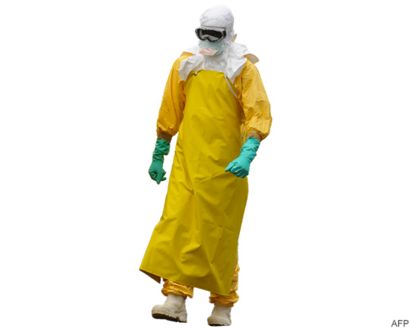Boris Johnson has said the government is at risk of promising "stuff that doesn't really make any sense" in its plans to prevent Ebola reaching the UK.
Screening of people arriving from Ebola-affected areas will start next week, but the mayor of London said this was a "far from perfect solution".
He said "you can't test everybody" and some infected people would get through.
A consultant has called screening a "political gesture", but a government expert said it would save lives.
Mr Johnson - who has been selected as the Conservative candidate for Uxbridge and South Ruislip in the 2015 general election - said blood tests could not be done on every person arriving in the UK, and temperature checks would not catch every case because the virus had an incubation period of up to three weeks before symptoms start.
"I have little doubt that eventually there will be a case of Ebola in this country and probably in this city," he told the BBC's Andrew Marr Show.
But he said "fantastic" medical preparations were in place.
'Blunt instrument'Screening - to be introduced at Heathrow and Gatwick airports and Eurostar terminals - will include questions about passengers' travel history and a "possible medical assessment", health officials said.
It is expected to focus on people who have recently been to the worst-affected West African countries - Sierra Leone, Liberia and Guinea.
In email seen by the BBC, a senior consultant involved in the screening programme said it was "unlikely to provide public health benefits".
But the government's chief medical officer, Dame Sally Davies, said although it was a "blunt instrument" it would save lives.
She said screening was "unlikely" to pick up any cases but stressed the "great advantage" would be to alert people to what symptoms to look for and what to do if they fall ill.
This would reduce their chances of dying and of spreading the virus to others, she said.
Ebola symptoms: What to do in the UK
Symptoms of Ebola include fever, headache, vomiting, diarrhoea and bleeding - but these are similar to more common infections like flu and some stomach bugs.
If you have these symptoms and have had contact with an Ebola patient, ring 111 first. Do not go directly to A&E or a GP.
If there has been no contact with Ebola, seek help from 111, your GP or A&E if necessary.
The chances of developing Ebola in the UK are low.
Similar measures are being taken in the US, with screening under way at New York's JFK airport and checks at some other airports due to start in the coming days.
US officials have said a Texas healthcare worker who treated an Ebola patient has tested positive for the virus.
Figures published by the World Health Organization on Friday showed there had been 4,024 confirmed or suspected Ebola deaths in Guinea, Liberia and Sierra Leone during the current outbreak.
INTERACTIVE
- ×

- ×
The cap forms part of a protective hood covering the head and neck. It offers medical workers an added layer of protection, ensuring that they cannot touch any part of their face whilst in the treatment centre.
- ×
Goggles, or eye visors, are used to provide cover to the eyes, protecting them from splashes. The goggles are sprayed with an anti-fogging solution before being worn.
- ×
Covers the mouth to protect from sprays of blood or body fluids from patients. When wearing a respirator, the medical worker must tear this outer mask to allow the respirator through.
- ×
A respirator is worn to protect the wearer from a patient's coughs. According to guidelines from the medical charity Medecins Sans Frontieres (MSF), the respirator should be put on second, right after donning the overalls.
- ×
A surgical scrub suit, durable hospital clothing that absorbs liquid and is easily cleaned, is worn as a baselayer underneath the overalls. It is normally tucked into rubber boots to ensure no skin is exposed.
- ×
The overalls are placed on top of the scrubs. These suits are similar to hazardous material (hazmat) suits worn in toxic environments. The team member supervising the process should check that the equipment is not damaged.
- ×
A minimum two sets of gloves are required, covering the suit cuff. When putting on the gloves, care must be taken to ensure that no skin is exposed and that they are worn in such a way that any fluid on the sleeve will run off the suit and glove. Medical workers must change gloves between patients, performing thorough hand hygiene before donning a new pair. Heavy duty gloves are used whenever workers need to handle infectious waste.
- ×
A waterproof apron is placed on top of the overalls as a final layer of protective clothing.
- ×
Ebola health workers typically wear rubber boots, with the scrubs tucked into the footwear. If boots are unavailable, workers must wear closed, puncture and fluid-resistant shoes.
Anda sedang membaca artikel tentang
Ebola screening not perfect - Boris
Dengan url
http://beritaasalusil.blogspot.com/2014/10/ebola-screening-not-perfect-boris.html
Anda boleh menyebar luaskannya atau mengcopy paste-nya
Ebola screening not perfect - Boris
namun jangan lupa untuk meletakkan link
Ebola screening not perfect - Boris
sebagai sumbernya
0 komentar:
Posting Komentar